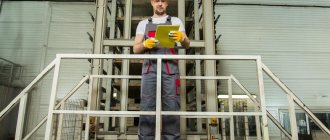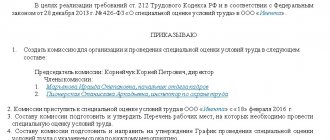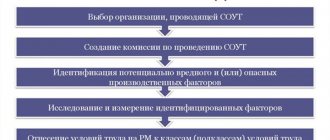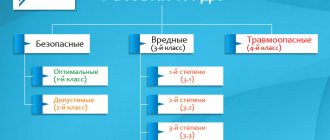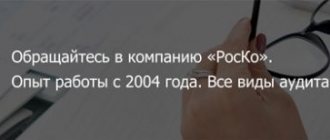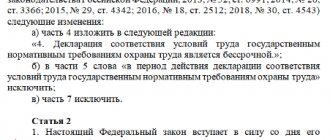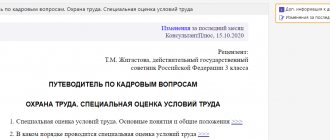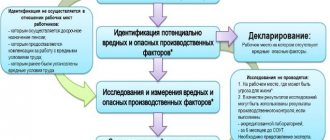The procedure for conducting a special assessment of working conditions is set out in the methodology for conducting special assessments, which was approved by Order of the Ministry of Labor dated January 24, 2014 No. 33n and is a mandatory procedure that consists of the following stages:
- identification;
- analysis of identified harmful factors;
- classification of the workplace based on the results of the study;
- drawing up a conclusion.
A special assessment of working conditions is not carried out in relation to:
- homeworkers;
- remote workers and workers who have entered into employment contracts with employers who are not legal entities.
Why is a special assessment needed and who is required to conduct it?
The state strives to ensure citizens the right to normal working conditions and guarantee compensation for harm caused to their health by harmful and dangerous factors present in their workplaces. One way to solve this problem is a set of procedures called a special assessment of working conditions (SOUT).
Labor legislation places the main burden of responsibilities in connection with conducting a special assessment on employers ─ they must, in due time, organize a survey of workplaces to identify dangerous and harmful production factors, and based on the results of such a survey, provide employees with additional guarantees and benefits.
What is a special assessment
A special assessment of working conditions (Federal Law No. 426-FZ) is an analysis of the working conditions of employees at a specific employer, carried out by a special organization at certain workplaces. The procedure is carried out by a special organization in order to:
- establish the presence of harmful conditions that are dangerous to human health, that is, those that lead to employee illness or injury (Article 209 of the Labor Code of the Russian Federation);
- assess the degree of their influence on the employee;
- determine the magnitude of deviation from the norm;
- establish the degree of effectiveness of the PPE and collective protective equipment used.
Based on the results of the SOUT, classes of working conditions at a specific place are determined (Part 2 of Article 3 426-FZ):
- optimal;
- acceptable;
- harmful;
- dangerous.
In the future, the class established for the workplace depends on:
- tariff of insurance contributions paid by the employer to the Pension Fund for the benefit of employees: better conditions - lower contribution;
- guarantees and compensation for employees in hazardous, hazardous work (additional leave - Article 117 of the Labor Code of the Russian Federation, reduction of working hours - Article 92 of the Labor Code of the Russian Federation, increase in salary - Article 147 of the Labor Code of the Russian Federation).
In general, improved working conditions lead to reduced costs for the employer.
How the legislation on SOUT changed until 2020
At first, special assessment activities were called “Workplace Certification”, then they were renamed SOUT (special assessment of working conditions). Since 2014, the main nuances of this procedure are regulated by the Law of December 28, 2013 No. 426-FZ “On the special assessment of working conditions.”
Since then, this law has been amended 5 times: by the laws of June 23, 2014 No. 160-FZ, of July 13, 2015 No. 216-FZ, of May 1, 2016 No. 136-FZ, of July 19, 2018 No. 208-FZ and of December 27, 2018 No. 553-FZ.
Despite the fact that the procedure for conducting special assessments has already been studied and has been used in practice for several years, the legislation on special assessment continues to be adjusted. The purpose of the amendments is to improve the quality of special assessments in order to ensure guarantees and rights of workers.
Now another package of amendments to Law No. 426-FZ is approaching ─ draft No. 769142-7 is already in the State Duma. The start of application of the new version of the law is scheduled for January 2021.
Organizational stage
After receiving a report on the carried out special assessment system, the customer company begins to optimize workplaces. For this purpose, the following documents are being developed:
- Plan of organizational measures to improve conditions and labor protection based on the results of a special assessment.
- Practical action plan to improve working conditions, indicating direct executors and responsible persons.
At the same time, the report is signed by all members of the commission and approved by the chairman. Each member of the commission has the right to write his own dissenting opinion on individual items of the report. After this, an order is created and signed to apply the results of the SOUT in production. This concludes the process of special assessment of conditions.
What's new in the SOUT procedure since 2020
Globally, legislators did not rewrite Law No. 426-FZ. But starting from 2021, there will be a number of significant adjustments to the procedure for conducting SOUT.
The changes affected not the special assessment procedure itself, but the preparatory stages for it and the final procedures, as well as a number of other provisions of Law No. 426-FZ.
If we list these amendments very briefly, they will fit into a few lines:
- the organization conducting the special assessment is responsible for registering the employer before the start of the special assessment in the FSIS SOUT system and then notifying him of the special identification number assigned by the system ─ without this number, the SOUT report will be invalid;
- the start of validity of the SOUT results will shift ─ it will be possible to use the results of the special assessment only after information about it appears in the FSIS SOUT (federal information system for recording the results of the special assessment). Now this moment is tied to the date of approval of the report.
Important clarification! New edition of Part 4 of Art. 8 of Law No. 426-FZ provides that the period of the special assessment will continue to be calculated from the date of approval of the report regarding the results of the special assessment, containing information that constitutes a state or other secret protected by law.
But that's not all the changes. In the new edition of Law No. 426-FZ, a number of other aspects will be corrected and added regarding the additional responsibilities of appraiser organizations, the timing of approval of the SOUT report, the use of UKEP when sending a copy of the approved report, etc. We will talk about them further.
What does the procedure for carrying out SOUT look like starting from 2021?
A special assessment is still required once every 5 years. The stages of its implementation are presented in the diagram:
And, of course, let’s not forget about filing a declaration - no one has canceled this obligation of the employer. Let us recall that such a declaration is submitted in relation to workplaces with optimal (class 1) or acceptable (class 2) working conditions (Article 11 of Law No. 426-FZ). Its form and procedure for submission are approved by Order of the Ministry of Labor dated 02/07/2014 No. 80n.
The declaration must be submitted within 30 working days from the date of approval of the special assessment report (Part 1, Article 11 of Law No. 426-FZ, paragraphs 3, 5 of Appendix No. 2 to Order of the Ministry of Labor No. 80n). The declaration can be submitted remotely on the Rostrud website (clarifications of the Ministry of Labor of the Russian Federation dated January 16, 2019).
Classification of working conditions
There are several risk classes
, according to which the workplace is assigned a specific one of them after the SOUT:
- 1st class - optimal conditions. There are no harmful effects on the employee’s body at work. At the same time, the normal performance of the workforce is maintained.
- Class 2 - acceptable conditions. With them, the employee has a sufficient amount of time to recuperate before starting work. The employee’s well-being under working conditions does not deteriorate.
- Class 3 - harmful conditions. In working conditions, an employee receives a negative impact on his body.
- Class 4 - traumatic conditions. If they occur, the employee may be injured, harm his health and future life activities.
The assignment of a class of working conditions is reflected in the declaration, the form of which is approved by order of the Ministry of Labor.
What will the employer additionally receive from the appraiser company starting from 2021?
Starting from 2021, the appraiser company will be obliged to inform the employer about the fact of sending information about the special assessment carried out at his enterprise to the FSIS SOUT. This is given 3 working days from the moment such information is sent (Part 3 of Article 18 of Law No. 426-FZ).
This obligation will be considered properly fulfilled only if the employer receives a notification from the appraiser company in one of the forms specified in the law:
- in the form of a paper notice delivered by registered mail with return receipt requested;
- in the form of an electronic document signed by UKEP.
Note that the appraiser company, according to the new version of the law, is given a number of responsibilities with clearly defined deadlines for their implementation:
- She is given 10 working days from the date of approval of the report to transfer information about the results of the special assessment to FSIS SOUT. The law requires this to be done in the form of an electronic document signed by the UKEP (Part 3 of Article 18 of Law No. 426-FZ).
- Within 10 days, she must inform Rostrud about changes in the composition of qualified experts and a reduction in the scope of accreditation of the testing laboratory (Article 19 of the new edition of Law No. 426-FZ).
When is a repeat special assessment needed, and when is an examination needed?
The results of the special assessment may not suit the employer or employees. To check the quality of the conducted SOUT, you can conduct a state examination for a specific workplace. The procedure for conducting the examination of SOUT was approved by Order of the Ministry of Labor of Russia dated August 12, 2014 No. 549n.
It’s another matter if, during the special assessment, there were violations of the methodology for its implementation or the requirements of the law and these violations were identified by inspectors during inspections. In this case, it is possible that the special assessment will have to be carried out again. A repeated special assessment is carried out based on the order of the state labor inspector.
In the new edition of Part 6 of Art. 24 of Law No. 426-FZ it is noted that the results of the examination of the quality of SOUT, consideration of disagreements on the issues of conducting a quality examination and the results of its implementation also need to be transferred to the FSIS SOUT. The responsibility for transferring this information to the information system is assigned to the body authorized to conduct the examination - the executive body of the constituent entity of the Russian Federation on labor protection issues at the location of the employer who conducted the special assessment (clause 1 of Article 24 of Law No. 426-FZ).
Errors and violations made during the implementation of SOUT
Listed below are the most common mistakes made by employers and appraisers when conducting special assessments:
- Employer mistakes.
Due to the special assessment, the employer may be punished by labor inspectors. It's all about the numerous requirements that the law imposes on this procedure.
Let's name the most common violations of employers during the implementation of SOUT:
| Item no. | Type of violation | What legal norm has been violated? |
| 1 | The employer did not organize a planned special assessment | A special assessment is carried out at least once every 5 years, unless otherwise established by this law (clause 4 of article 8 of the Law of December 28, 2013 No. 426-FZ “On special assessment of working conditions”) |
| 2 | The employer did not organize an unscheduled special assessment | In a number of cases, the law obliges employers to carry out unscheduled SOUT (Article 17 of Law No. 426-FZ). For example, when changing the technological process, replacing production equipment, which can affect the level of exposure to harmful and (or) hazardous production factors on workers, etc. |
| 3 | SOUT was carried out by a company that does not have the appropriate accreditation (the special assessment report is invalid) | The requirements for such companies are specified in Art. 19 of Law No. 426-FZ. The list of companies authorized to carry out SOUT is posted on the website of the Ministry of Labor of the Russian Federation |
| 4 | The employer did not familiarize the employees with the results of the SOUT | The employer is given 30 calendar days from the date of approval of the SAW report to familiarize employees with the results of the assessment of their jobs. It does not include periods of temporary incapacity for work of the employee, being on vacation or a business trip, periods of rest between shifts (Clause 5 of Article 15 of Law No. 426-FZ) |
| 5 | The procedure for conducting a special assessment has not been followed (the results of the special assessment may be considered invalid) | The methodology for conducting a special assessment and the Classifier of harmful and (or) hazardous production factors, the form of the report on the implementation of the SOUT and instructions for filling it out were approved by Order of the Ministry of Labor of the Russian Federation dated January 24, 2014 No. 33n |
| 6 | Incorrect application of special assessment results | When providing compensation for work in harmful and (or) dangerous conditions, one cannot be guided solely by the results of a special assessment of workplaces. It is necessary to take into account the requirements of other legal acts of the Russian Federation (for example, the right to additional leave “for harmfulness” for medical workers of psychiatric medical institutions does not depend on the class of working conditions established based on the results of the special labor assessment, which is provided for other employees of medical organizations in accordance with paragraph 4, part 1 Article 22 of Law No. 3185-1) |
| 7 | The employer did not involve representatives of the trade union organization to participate in the special assessment procedure | If the company has a trade union or other representative body of workers, its representative must be included in the commission for conducting special labor assessment (part 2 of article 9 of Law No. 426-FZ) |
| 8 | The employer did not inform employees about the date of the special assessment, and they were unable to be present during it. | An employee has the right to be present during a special assessment at his workplace (Part 1, Article 5 of Law No. 426-FZ) |
| 9 | The employer did not take into account the suggestions of employees when identifying potentially harmful or dangerous production factors | The employee has the right to contact the employer, his representative, the organization conducting the special assessment, the expert of the organization conducting the special assessment with proposals for identifying potentially harmful and (or) dangerous production factors at his workplace and for obtaining clarification on the issues of conducting a special assessment of working conditions at work. his workplace (Article 5 of Law No. 426-FZ) |
| 10 | The special assessment commission did not identify all the harmful factors that affect employees | Identification of potentially harmful and (or) dangerous production factors in the workplace is carried out by an expert from the appraiser company. The results of identification of potentially harmful and (or) dangerous production factors are approved by the commission (Part 2 of Article 10 of Law No. 426-FZ) |
When should a special assessment be carried out?
Federal Law No. 426-FZ determined that for a number of workplaces, a special assessment can be carried out in stages and must be completed by December 31, 2018. The same date is permitted for the application of the results of a previously conducted certification of places of work (Letter of the Ministry of Labor dated 06/01/2018 No. 15-4/10/B-40).
SOUT must be carried out no later than 12 months from the date of creation of a new place of work. If an institution has been operating for more than a year, and a special assessment has never been carried out, it is necessary to urgently initiate the procedure. In general, we advise you to follow the rule that it is better to carry out an SAW at a newly organized workplace no later than six months from the date of creation. In accordance with Article 212 of the Labor Code of the Russian Federation, the employer must ensure safe working conditions, labor protection for workers and proper informing them regarding hazards at work. This means that the employee has the right to demand information about the degree of harmfulness of the influence of environmental conditions on his body. Failure by the employer to provide the required information is a violation of current legislation. The validity period of the special assessment is 5 years.
We’ll tell you in more detail how to conduct SOUT in an organization.
Automatic fines SOUT 2021
For the fact that an employer violated the rules for conducting a special assessment established by law or did not carry out this procedure at all, in 2020 they will continue to be punished under Part 2 of Art. 5.27.1 Code of Administrative Offenses of the Russian Federation.
The penalties have not changed - the employer will be warned or fined in the following amounts:
- officials and individual entrepreneurs - from 5,000 to 10,000 rubles;
- companies - from 60,000 to 80,000 rubles.
The differences between the 2020 fines and those in force in 2021 are the possibility of their imposition not only by inspectors during inspections, but also the generation of fines automatically.
A special computer program will monitor information received by FSIS SOUT and compare data on the registration period of employers with information on the special assessment they conducted. If the program detects that the company has been operating for more than a year, but has not carried out a special assessment, a fine under Part 2 of Art. 5.27.1 of the Code of Administrative Offenses of the Russian Federation will be calculated automatically without the participation of controllers.
Responsibility of the employer and appraiser
The special assessment was planned to provide workers with additional guarantees and protection. Responsibility for failure to comply with the requirements for the assessment procedure is provided for the employer and the appraiser. Thus, according to Article 5.27.1 of the Code of Administrative Offenses of the Russian Federation, for violation of the procedure for conducting special assessment work, including for failure to comply with the deadlines for informing subordinates about the results of the assessment, officials and individual entrepreneurs can be fined 5,000–10,000 rubles, and legal entities - 60,000– 80,000 rubles.
For appraisers, the maximum fines for dishonest performance of obligations are higher:
- for officials - up to 50,000 rubles or disqualification for up to 3 years;
- for organizations - up to 200,000 rubles or suspension of activities for up to 90 days (Article 14.54 of the Code of Administrative Offenses of the Russian Federation).
Let's sum it up
- Starting from 2021, amendments and additions are being made to the Law “On Special Assessment of Working Conditions” dated December 28, 2013 No. 426-FZ, according to which SOUT participants will have new responsibilities.
- The appraiser company will be obliged, before the start of the SOUT, to register the employer in the FSIS SOUT and inform him of the identification number assigned to him by this system - without this number, the SOUT report will be invalid.
- It will be possible to use the results of the special assessment only after information about it appears in the FSIS SOUT (currently this moment is tied to the date of approval of the report).
- The appraiser company will have a new obligation to inform the employer about the fact of sending information to FSIS SOUT about the special assessment carried out at his enterprise. This is given 3 working days from the moment such information is sent to the information system.
- From 2021, fines for violating the procedure for conducting special assessments and failure to conduct a special assessment will be assessed not only based on the results of inspections, but also automatically based on the results of monitoring the information available in the information system.
If you find an error, please select a piece of text and press Ctrl+Enter.
